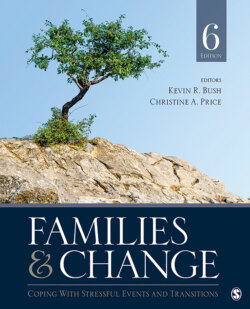Читать книгу Families & Change - Группа авторов - Страница 67
На сайте Литреса книга снята с продажи.
Daily Hassles
ОглавлениеParents’ daily hassles include constant caregiving demands and pressures from everyday tasks involved in caring for and socializing children (Finegood et al., 2017; Helms, Postler, & Demo, Chapter 2 in this volume). Many everyday child-rearing experiences are sources of self-defined competence and satisfactions by parents as they engage in playful activities with children, solve parent–child challenges, and enjoy the developmental progress of their young (Bush & Peterson, 2008, 2013; Peterson & Bush, 2015). In contrast, other parenting experiences are less positive, such as when Tiffany reports dealing with her children’s whining, their annoying conduct due to underdeveloped self-control, endless cleaning-up activities, loss of sleep, toilet training, constant interruptions, lack of personal time, and seemingly endless errands. Some hassles are infrequent and situational, whereas others occur repeatedly as part of everyday life (Crnic et al., 2005; Crnic & Low, 2002, Kalil et al., 2014; Yoon et al., 2015). By itself, each hassle may have limited consequences, but the cumulative impact of daily hassles may lead to substantial amounts of parental stress (Finegood et al., 2017; Helms, Postler, & Demo, Chapter 2 in this volume; Hennon et al., 2009).
Single-parent families may be subject to problems stemming from the rapid accumulation of daily hassles and other stressors. One reason for this “accumulation” problem is that adult partners are now absent or are no longer sharing the everyday challenges of child-rearing. For example, although Tiffany’s ex-husband pays some child support (he is only inconsistently employed), he is not involved with the children regularly to share everyday tasks. The daily hassles of single parents may be complicated by stress resulting from economic disadvantage, employment conflicts, and limited social support. Single parents often must face an accumulation of challenges that leads to feelings of isolation, exhaustion, depression, distress, and diminished feelings of parental efficacy (Kremer-Sadlik & Paugh, 2007; Ontai et al., 2008). Although many single parents provide positive environments for children, this accumulation of daily hassles may push parent–child relationships gradually in problematic directions over time (Ontai et al., 2008). When daily hassles occur regularly, parents who once were satisfied and competent, may gradually become fatigued, dysfunctional, and subjected to growing stress (Dunning & Giallo, 2012). These evolving circular processes may give rise to unresponsive, and less satisfied parents, along with children who demonstrate acting out and problematic behaviors (Crnic et al., 2005; Crnic & Low, 2002; Neece et al., 2012).
